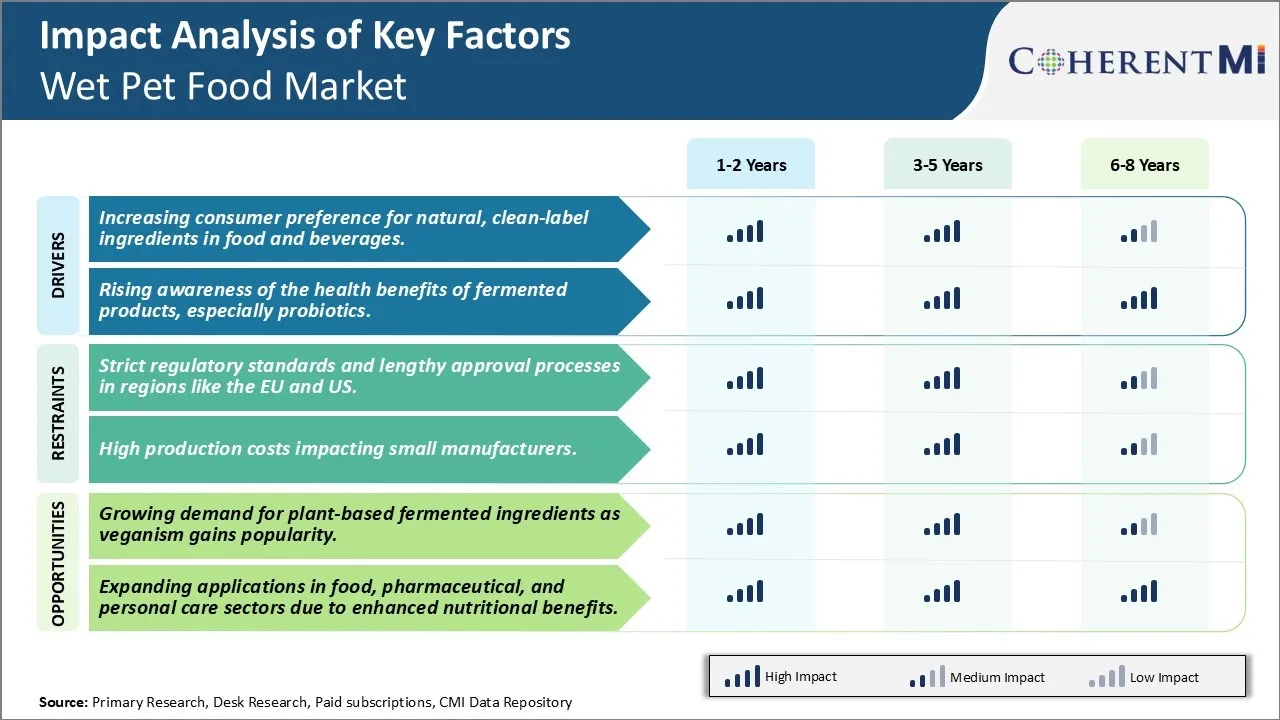Wet Pet Food Market Trends
Market Driver - Increasing Consumer Preference for Natural, Clean-Label Ingredients in Food and Beverages
As more and more consumers are becoming aware of the ingredients used in their food products and how those ingredients can impact their health, the demand for natural and clean-label pet food has significantly rose over the past few years. Pets are considered as part of the family by many households nowadays and people want only the best for their furry companions. Several studies have found links between certain artificial preservatives, colors, and flavors used in pet food with negative health issues in pets. This has scared consumers and reduce the trust in brands that use artificial or chemical-sounding ingredients in their products.
People today are making more informed purchase decisions after thoroughly checking the ingredient labels. Terms like "natural", "preservative-free", "grain-free" are big marketing USPs now. The clean-label revolution started in human food and have now significantly influenced pet owners' preferences. Even premium pet food brands that did not earlier emphasize on natural positioning had to reformulate their products. Variants with natural appeal are particularly selling well.
Consumers are also actively participating in online communities and researching best practices of feeding pets. This awareness helps them identify ingredients to avoid colors, flavors, preservatives and look for alternative options. Brands are formulating products grounded in nutritional science to meet these evolving needs. For example, instead of artificial preservatives, they are using natural preservatives like vitamin E or citric acid. Region-specific products customized for dogs and cats with nutritional needs pertaining to lifestyle and local environment are further helping gain consumer confidence.
Market Driver - Rising Awareness of Health Benefits of Fermented Products, Especially Probiotics
There is a growing body of research that connects the gut health of pets with their overall well-being much like in humans. Studies show fermented ingredients like probiotics support digestive health, strengthen immunity and provide various other health benefits. The concept of probiotics is no more limited to yogurts and supplements for humans, it has got widely accepted and integrated into premium pet food as well. Consumers have started recognizing probiotics as "friendly bacteria" that balance the gut microflora and create a barrier against potential threats.
A probiotic-rich diet is especially important for pets that are prone to digestive issues like dogs and cats. It promotes absorption of nutrients and counteracts risks from antibiotics or situations of high stress. With progressive modern lifestyles, pets also face comparable health challenges as humans do because of factors like limited access to outdoors, processed packaged food lacking nutrients. Fermented ingredients fortify their gut in natural ways without any known side effects. Brands have capitalized on research studies to highlight probiotic credentials of their products. Innovations like fermenting specific meat varieties or adding probiotic supplements have given consumers more choices.
Through various marketing campaigns using influential experts and KOLs in pet health space, awareness about these "good bacteria" have significantly increased among pet owners. This has become a key driver of parental decisions towards premium products with live probiotic cultures.

Market Challenge - Strict Regulatory Standards and Lengthy Approval Processes in Regions Like EU and the U.S.
One of the major challenges faced by the wet pet food market is the strict regulatory standards and lengthy approval processes that manufacturers must follow, particularly in regions like the European Union and United States. In these markets, all pet food products must undergo extensive safety testing and obtain regulatory approval before hitting the shelves. This can include microbiological and nutritional analysis as well as packaging and labeling compliance. The approval timelines vary between products but on average take 9-12 months for new formulas or ingredients to clear testing and receive the green light. This significantly impacts the speed at which companies can innovate and launch new products, putting them at a disadvantage compared to markets with more flexible regulations. The stringent rules also increase costs substantially throughout the product development phase. Gaining approvals across multiple international markets requires even more investment of time and capital. Complying with constantly evolving standards further burdens manufacturers. While regulations are important for quality assurance, the cumbersome nature of the system presents a major obstacle for growth and agility within the wet pet food industry.
Market Opportunity- Growing Demand for Plant-Based Fermented Ingredients
The wet pet food market has an opportunity arising from the growing popularity of veganism and interest in more sustainable ingredients. As more owners adopt vegan or plant-based diets for themselves, they look for similar options for their pets that are nutritious as well as environmentally-friendly. Fermented plant proteins are gaining attention due to their ease of digestion and high nutritional value as an alternative to meat-based ingredients. Using strains of fungi and bacteria that break down plant material, manufacturers can create savory, meat-like textures from vegetables, grains and legumes that appeal to both cats and dogs. The production process enhances the protein and amino acid content as well. With ongoing consumer demand for vegan products, the fermentation of plant-based ingredients provides a meaningful opportunity for pet food brands to attract new customers seeking sustainable options without compromising on pet nutrition or taste.